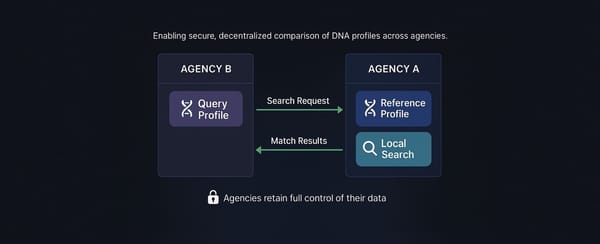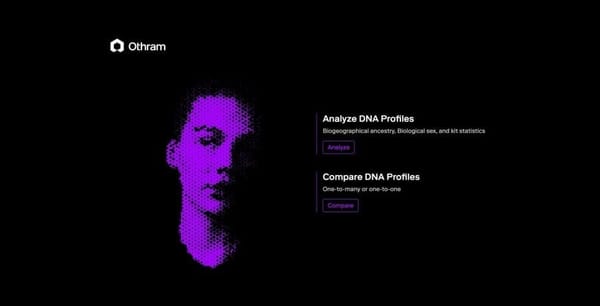At Othram, we’ve spent the last six years obsessing over one goal: building the most accurate and sensitive DNA profiles possible. This focus has enabled us to identify distant relatives and solve cases that were once thought unsolvable. The results speak for themselves.
The Challenge of Fragmented Forensic Genetic Genealogy
Forensic genetic genealogy testing involves numerous steps, often performed by different vendors using a variety of different methods and tools. Because the field is new, many times the methods and tools are not designed or even intended for forensic use. This fragmentation can lead to a suboptimal outcome, in which each piece of the process is disjointed, causing inefficiencies and potentially missing critical connections. Sometimes it leads to complete failure—no profile or a profile that can’t be used in forensic genetic genealogy search. But in forensics and criminal justice, where the stakes are incredibly high, we can’t afford anything less than the best-case scenario. So, what’s the solution?
The Power of Complex Coordination
We’ve found the answer in a concept called complex coordination. This approach involves integrating various components into a cohesive system that’s far superior to what could be built in isolation by different groups.
It’s important to note that simply bundling a bunch of services or in-sourcing various steps under one roof is not the same as complex coordination. Complex coordination requires true integration where each part of the process is not only optimized for its specific function but also designed to work harmoniously with every other part. Imagine building a car: if you have the best engine, but the tires and transmission come from different manufacturers without any coordination, the car might not run efficiently, or it might not run at all. But if every component is designed to work together, the car performs at its best.
Similarly, in forensic genetic genealogy, optimizing each step for forensic applications and ensuring that all parts work harmoniously together is crucial. Complex coordination allows us to align the entire process, from DNA extraction to profile building to database search, thereby creating a seamless and powerful system that improves outcomes at every step.
Applying Complex Coordination to Forensics
When Othram entered the forensic market, we faced a landscape where off-the-shelf methods—originally designed for consumer or medical testing—were being used. These methods weren’t ideal for the challenging nature of forensic samples. Recognizing this gap, we developed Forensic-Grade Genome Sequencing® (FGGS) technology to specifically address the difficulties of building ultra-sensitive DNA profiles from nearly any forensic sample.
Even with ultra-sensitive DNA profiles, we realized that the next step was to integrate database search algorithms into our workflow. Traditional genetic genealogy databases were never designed with forensic profiles in mind. Forensic profiles can be incomplete, contain multiple contributors, and present other complexities that make them difficult to work with. Sometimes, profiles don’t even upload to these databases, requiring expensive bioinformatics consultants to manipulate the data. And even when they do upload, the profiles may not be optimal, leading to missed matches. This highlighted the need for search algorithms specifically designed for forensic use.
A Strategic Partnership: Integrating FamilyTreeDNA
In January 2024, we took a significant step forward by integrating the FamilyTreeDNA database into our workflow. This partnership allows us to combine our expertise in forensic genetic genealogy with the world’s largest database of consented DNA profiles, creating a powerful tool for solving cases. You can learn more about this partnership here.
The Future of Forensics: Introducing Multi-Dimensional Forensic Intelligence (MDFI)
The integration of the FamilyTreeDNA database is just the beginning. With our new platform, Othram MDFI, we’re laying out a roadmap to build best-in-class technology that delivers a secure, private, and seamlessly integrated experience for law enforcement and investigators. This includes:
- Ultra-sensitive DNA profiles built with FGGS® technology.
- Success from nearly any forensic DNA evidence through advanced methods.
- Conservation of evidence & budgets with predictive suitability analysis.
- Enhanced analysis of profiles & mixtures using AI & machine learning.
- Access to the largest forensic database in the world to accelerate identifications.
- In-house, turnkey support for pursuing investigative leads.
- Multidisciplinary expertise to tackle any barrier in investigations.
- KinSNP® familial testing for rapid, secure reference DNA testing.
- On-demand and automated forensic reporting & documentation to streamline workflows.
- Self-service, 24/7 case management & transparency to ensure full visibility into the investigative process.
Join Us in Pioneering the Future of Forensic Science
With MDFI, Othram is leading the charge into a new era of forensic genetic genealogy. By integrating the entire process, we’re not just building better tools—we’re creating a cohesive, optimized system that works in concert to solve cases more accurately and faster than ever before. This is complex coordination at its finest, and it’s paving the way for the future of forensic science.
And we’re just getting started. Already, we’re able to search DNA profiles that were previously deemed unsearchable.
Let’s work together to unlock answers and bring justice to those who need it most. Get started here.






